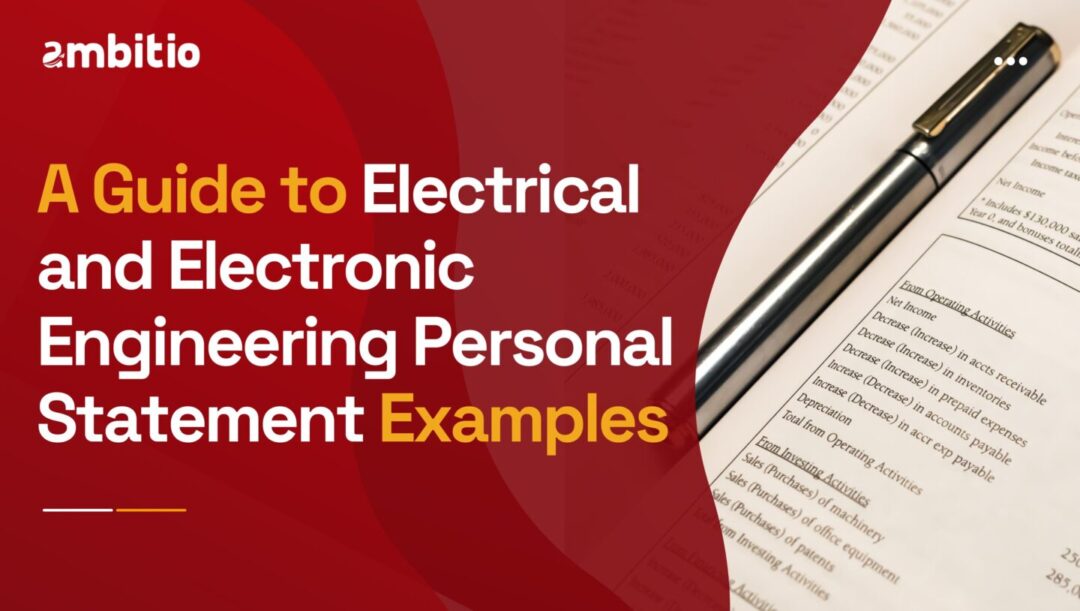1 September 2024
7 minutes read
A Guide to Electrical and Electronic Engineering Personal Statement Examples

Key Takeaways:
- Illustrate Passion: Begin by sharing what initially sparked your interest in electrical and electronic engineering, detailing specific instances or projects that deepened this passion.
- Academic and Technical Foundation: Highlight your academic achievements in relevant areas like mathematics and physics, and discuss technical projects to showcase your skills and problem-solving abilities.
- Soft Skills: Reflect on your teamwork, leadership, and communication experiences, demonstrating how these soft skills are integral to success in the engineering field.
- Extracurricular Engagement: Emphasize how your involvement in extracurricular activities, such as science clubs or engineering competitions, has enriched your understanding and skills in electrical and electronic engineering.
- Future Aspirations: Articulate your long-term goals within electrical and electronic engineering, showing how your aspirations align with current trends and the program you are applying for.
Embarking on a journey in electrical and electronic engineering begins with a compelling personal statement. This crucial document is your chance to communicate your enthusiasm for the field, your educational background, and your long-term career goals. It’s about creating a connection with the reader and setting yourself apart in a pool of applicants.
The Essence of a Personal Statement in Electrical and Electronic Engineering
Capturing Your Passion for Electrical and Electronic Engineering
The Spark of Interest
Start by narrating what drew you to electrical and electronic engineering. Was it a fascination with how electronic devices work? Or perhaps a school project that opened your eyes to the wonders of electrical circuits? This section should capture the essence of your passion, tracing its development through various stages of your life. Include specific instances, like a particular project or challenge that solidified your interest in this field.
Academic Foundations
Your academic background forms the bedrock of your personal statement. Here, emphasize your proficiency and interest in subjects like mathematics and physics. Detail how these subjects have laid the groundwork for your aspirations in electrical and electronic engineering. Discuss any specific modules or topics that particularly intrigued you and how they align with your career objectives.
Showcasing Your Technical and Soft Skills
Technical Proficiency
Dive into the technical aspects of your education and experience. Highlight any relevant projects, such as building a circuit board or programming a microcontroller. Discuss the technical challenges you faced and how you overcame them. This section is not just about showcasing your technical skills, but also demonstrating your problem-solving abilities and creativity.
Soft Skills in Engineering
In this subsection, reflect on the soft skills you’ve developed that are pertinent to a career in engineering. Talk about teamwork experiences, leadership opportunities, and any collaborative projects you’ve been part of. Emphasize how these experiences have prepared you for the collaborative and interdisciplinary nature of electrical and electronic engineering.
The Impact of Extracurricular Activities
Beyond the Classroom
Your involvement in extracurricular activities can significantly bolster your personal statement. Discuss how activities outside the classroom have contributed to your growth and understanding of electrical and electronic engineering. This could include participation in science clubs, engineering competitions, or relevant volunteer work. Explain how these experiences have enriched your perspective and skills relevant to your chosen field.
Integrating Interests and Hobbies
In this section, weave in your hobbies and interests and how they relate to electrical and electronic engineering. Perhaps you enjoy DIY electronics projects, or you’re an avid follower of the latest developments in renewable energy. These interests can provide a more holistic view of your personality and dedication to the field.
Articulating Long-Term Goals and Aspirations
Vision for the Future
In this section, outline your long-term career aspirations. Are you aiming for a career in innovative technology development, or do you see yourself playing a pivotal role in sustainable energy solutions? Discuss how a degree in electrical and electronic engineering is a stepping stone towards these goals.
Aligning Goals with Current Trends
Align your aspirations with current trends and future directions in electrical and electronic engineering. Whether it’s the growing importance of renewable energy, the advancement of AI in electronics, or the development of new communication technologies, show that you are aware of and excited about the future of the field.
Quick Tips:
- Personal Anecdote: Start your statement with a personal anecdote that captures your initial fascination with electrical and electronic engineering, making your introduction memorable.
- Balance Technical and Accessible Language: Ensure your statement balances technical detail with accessibility, making it understandable to both specialists and non-specialists.
- Customization: Tailor your statement to reflect your knowledge of and enthusiasm for the specific program and institution you’re applying to, demonstrating a good fit.
Addressing the Unique Aspects of Electrical and Electronic Engineering
- Interdisciplinary Integration: Electrical and electronic engineering seamlessly integrates principles from physics, mathematics, and computer science, creating a rich interdisciplinary platform for innovation. This unique blend allows engineers to design and develop complex systems, from microprocessors to large power grids.
- Rapid Technological Evolution: The field is at the forefront of technological advancement. It continuously evolves with emerging trends like AI, IoT, and renewable energy, offering endless opportunities for engineers to engage with cutting-edge technology and address new challenges.
- Impact on Everyday Life: Electrical and electronic engineering has a direct impact on everyday life. From smartphones to medical devices, it plays a crucial role in the development of technologies that have become integral to modern living.
- Sustainability and Renewable Energy: The field is pivotal in addressing global challenges such as climate change and sustainable energy. Engineers in this domain are crucial in the development of renewable energy systems, smart grids, and energy-efficient technologies.
- Problem-Solving and Innovation: It emphasizes critical thinking and problem-solving, where engineers must often think outside the box to develop new solutions to complex problems, be it in communications, robotics, or power systems.
- Global Relevance and Connectivity: Electrical and electronic engineering contributes significantly to building a globally connected world. From telecommunications to global positioning systems, it is essential to create and maintain a global network that connects people and information.
- Practical and Theoretical Balance: This field offers a unique balance of practical hands-on experience and theoretical knowledge. Engineers must understand the underlying principles and theories while also being adept at applying this knowledge in practical, real-world situations.
- Customization and Flexibility: The field allows for a high degree of customization and flexibility in career paths. Engineers can specialize in a variety of sub-disciplines, such as telecommunications, power engineering, or digital electronics, tailoring their careers to their interests and strengths.
- Collaboration Across Industries: Engineers often collaborate with professionals in other sectors, such as healthcare, automotive, and manufacturing. This inter-industry collaboration expands the scope and impact of their work, leading to innovative cross-disciplinary applications.
- Ethical and Societal Impact: Electrical and electronic engineering carries significant ethical responsibilities and societal impacts. Engineers must consider safety, privacy, and ethical implications in their designs, ensuring that technological advancements benefit society as a whole.
Personal Statement Example for Electrical and Electronic Engineering
Ever since I was young, I have been fascinated by how things work. This curiosity was not satisfied by mere observation; it demanded engagement and understanding. My first encounter with a dismantled radio at the age of ten was a pivotal moment. I was captivated by its complex circuitry and the way its components worked in harmony to produce sound. This childhood curiosity has blossomed into a fervent aspiration to pursue a career in electrical and electronic engineering, a field that combines my passion for technology, problem-solving skills, and a deep-rooted desire to contribute to advancements in technology.
During my high school years, I excelled in mathematics and physics, subjects that further fuelled my interest in engineering. I was particularly drawn to the elegance of electrical theories and the practical applications of electronics. Projects like designing a simple burglar alarm system or building a basic robot not only provided a hands-on learning experience but also honed my analytical and problem-solving skills. These projects were not just academic tasks; they were challenges that gave me a glimpse into the rigors and rewards of engineering.
My internship at XYZ Tech Solutions was a turning point in my educational journey. Working alongside seasoned electrical engineers, I gained invaluable insight into the practical aspects of the field. I was involved in a project focused on improving the efficiency of solar panels. This experience not only enhanced my technical skills but also taught me the importance of teamwork and communication in achieving a common goal. I realized that engineering is not just about individual brilliance but also about collective effort and collaboration.
I have also actively participated in extracurricular activities that complement my academic pursuits. As a member of the school’s robotics club, I led a team in a national robotics competition, where we designed and built a robot capable of performing complex tasks. This experience was not only intellectually stimulating but also helped me develop leadership and project management skills. It was a practical demonstration of how theoretical knowledge could be applied to solve real-world problems.
My long-term goal is to specialize in power systems and renewable energy. I am particularly interested in the development of smart grids and their potential to revolutionize energy distribution and consumption. The prospect of contributing to sustainable energy solutions is a powerful motivator for me. I believe that my background in mathematics and physics, combined with my practical experiences and leadership skills, makes me well-suited for a degree in electrical and electronic engineering.
In conclusion, I am eager to delve deeper into this field and contribute to innovative solutions. I am confident that a degree in electrical and electronic engineering will not only equip me with the necessary technical knowledge but also provide a platform to turn my passion into a meaningful career. I look forward to the opportunity to join your esteemed program and take the first step toward realizing my professional aspirations in this exciting and ever-evolving field.
Conclusion
Your personal statement is more than just an academic summary; it’s a reflection of your journey, aspirations, and the unique perspective you bring to the field of electrical and electronic engineering. It’s your opportunity to make an impression and pave the way for your educational and professional future.
Use this guide as a blueprint to craft a statement that not only showcases your achievements and skills but also your passion and vision for a career in this exciting and ever-evolving field.
Craft your success narrative with Ambitio Elite. Personalized guidance, AI-driven strategies, and expert mentorship await. Enroll now to elevate your academic journey! Join Ambitio Elite
FAQs
How important is it to include personal experiences in my electronic engineering personal statement?
It’s very important. Personal experiences provide context to your passion and aptitude for the field, making your statement more engaging and authentic.
Can I include experiences unrelated to engineering in my statement?
Yes, if you can relate them to skills relevant to engineering, like problem-solving, teamwork, or analytical skills.
How technical should my personal statement be?
While it’s good to showcase your technical knowledge, remember the statement should also be accessible to non-specialists. Focus on how your technical interests have shaped your career aspirations.
Should I mention specific universities or programs in my statement?
Only if you are writing a tailored statement for a specific program. Generally, keep your statement broad enough to be applicable to multiple universities.
How can I start my personal statement for electrical and electronic engineering?
Start with a personal anecdote or experience that ignited your interest in the field. This could be as simple as a childhood fascination with electronics or a significant project you worked on at school.

You can study at top universities worldwide!
Get expert tips and tricks to get into top universities with a free expert session.
Book Your Free 30-Minute Session Now! Book a call now




























